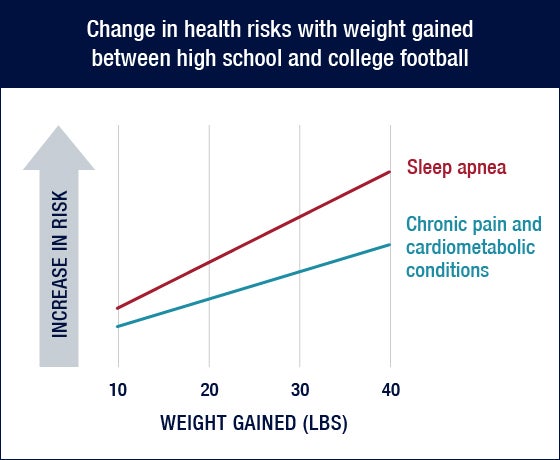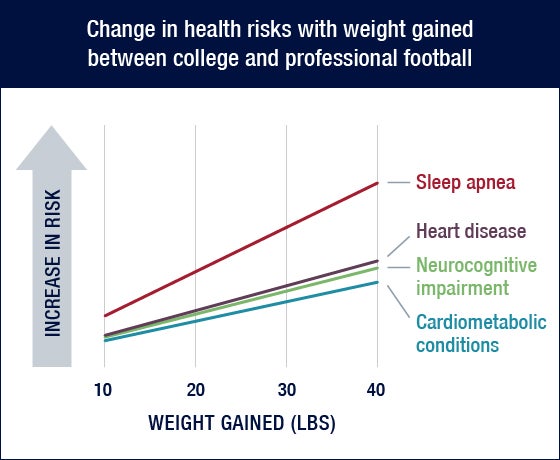Results: Impact of Football-Related Weight Gain
Thanks to the thousands of former players who completed our First Health and Wellness Questionnaire (Q1), we are gaining a clearer picture of your health. Below are early research results on the potential consequences of football-related weight gain, along with action steps you and your peers might take to be proactive about your health.
What the Science Says
Our research indicates that former players who experienced substantial weight gain between high school football and professional play may be at a higher risk for later-life disease. Specifically, we found that:
- Every 10 pounds of weight gained between college football and professional play increases the risk of sleep apnea by 25%, heart disease by 14%, neurocognitive impairment by 13%, and cardiometabolic conditions by 11%.*
- Every 10 pounds of weight gained between high school and college football raises the risk of sleep apnea by 15% and chronic pain and cardiometabolic conditions by 9%.*
- Former players gained an average of 40 lbs. between high school football and present day, with the majority of weight gained during the football playing years.
*Heart disease refers to heart attack, stroke, or heart surgery, while cardiometabolic conditions represents high cholesterol, blood pressure, or blood sugar. Neurocognitive impairment refers to a diagnosis of dementia or memory loss.
While past research has demonstrated the consequences of post-career weight gain, this is the first study to show that play-related weight gain may be harmful to former players, regardless of the player’s present-day weight.
Potential Action Steps
If you’ve experienced substantial weight gain over the course of your football career:
- Talk with your doctor about getting a comprehensive work-up that includes assessments of your heart, sleep, brain, and metabolic health. This will help you to identify those areas of your health most in need of attention.
- Work with your doctor to address any conditions that are treatable. Treating even just one problem, such as sleep apnea, may lead to significant improvements across many areas of your health and better your overall quality of life.
- Be proactive about managing those areas of health that screenings or your medical history indicate should be a priority for you. Early intervention is one of the best ways to head off problems before they start.
Resources
Below is a list of external resources that may assist you in being proactive about your overall health:
- The TRUST: Brain and Body Assessment
- Cleveland Clinic: Five Smart Questions to Ask Your Doctor
- The TRUST’s Medical/Wellness Tips
If you have questions about the information above or would like to learn more about the Study, please call us (617.432.5000) or email us.
Read the paper: Weight Gain and Health Affliction Among Former National Football League Players
- Bringing Insights Home to Alumni
- Study Shows Rise in Suicide Rate Among NFL Players
- Behind the Helmet: Caring for the Families Who Care for NFL Players
- Our Approach to TBI & Neurodegenerative Disease
- Osteoarthritis and Former NFL Players
- For Former NFL Players, Football Before Age 12 Not Linked to Worse Health Later in Life: Study
- Playing Football At Younger Ages Not Linked With Poor Health Outcomes
- Offensive and Defensive Strategies for Men’s Health Webinar – September 26, 2023
- Examining Race Trends in the NFL: Diversity, but not Inclusion
- Research Spotlight: New Research Suggests PET Test for Chronic Traumatic Encephalopathy Has Limited Value
- Unexpected Finding: In-Person Assessment Study of Former NFL Players Leads to Treatable Neurological Condition
- Football Players Health Study Enters Next Phase
- Concussions and Cognitive Performance
- Our Gratitude to James D. (Jim) McFarland: 1947-2020
- After the Game Is Over
- Research Huddle Podcast: The Brain Health Study
- Meet the Doc – Ross Zafonte, DO
- Moving forward: Minimally-Invasive ACL Repair
- Building a Better Knee Brace for NFL Players
- Advancing Research on Potential Treatment for TBI
- Preliminary Results Infographic: Exercise and Weight Gain
- In-Person Assessments: Visits to Boston Hospitals for Testing, Scans, and Other Evaluations
- Epidemiology: Study of Patterns within a Population
- Targeted Studies: Prevention, Diagnostics, and Interventions Developed by Researchers, and Innovative Approaches to Testing Players Remotely
- Preliminary Results Infographic: Positions, Conditions, and Quality of Life
- More Preliminary Results from the First Health Questionnaire
- Preliminary Results from the First Health Questionnaire
- Researchers at the University of Houston Law Center and Harvard Law School Address Legal Issues in Evaluating NFL Player Health and Performance
- Innovation Challenge – Chronic Pain
- Innovation Challenge – Sleep Apnea
- Job Posting: Postdoctoral Research Fellow
- Bridge-Enhanced ACL Repair (BEAR) Technique
- Harvard Launches ResearchKit App to Support Football Player Health
- Our Gratitude to Willie Richardson: 1939-2016
- A Visit with Former Players: Pre-Super Bowl 50 Trip
- Talks@12: Tackling Football Injuries
- Milestone: Over 2,570 Former Players Participate in our Study
- Widening the Field
- NFL Spouses and Partners Face High Levels of Caregiver Burden, Anxiety, and Depression
- Study of Former NFL Players Finds 1 in 3 Believe They Have CTE
- Study of Former NFL Players Reveals Racial Disparities in Chronic Pain
- Case report: Former Football Player’s Cognitive Symptoms Improved after Study Revealed Alternative Diagnosis and Treatment
- For Former Football Players, Concussion and Hypertension Go Hand in Hand, New Study Shows
- Do Former Football Players Age Faster?
- Study Points to Health Disparities Among Former NFL Players
- Inappropriate Diagnoses
- Number of Years in NFL, Certain Positions Portend Greater Risk for Cognitive, Mental Health Problems in Former Players
- Concussions Linked to Erectile Dysfunction in Former NFL Players
- Can Relationships and Personal Networks Impact the Health of Former Pro Football Players?
- Study Hints at Elevated Cardiac Risk Among Former Football Players with ACL Tears
- Listening to NFL Players: On Mental Health
- New Article Examines the Possibility of Applying Workplace Safety Rules to the NFL
- Harvard Report Compares NFL’s Health Policies and Practices to Those of Other Professional Sports Leagues
- Recommendations to Improve NFL Player Health
- Scientists Develop Antibody to Treat Traumatic Brain Injury and Prevent Long-Term Neurodegeneration
- EXCLUSIVE: New Research Explores Rising Suicide Rates Among Former NFL Players
- ‘They Were All Young’
- What to Know About the Brain Disease CTE
- Assessing Football Players’ Health Beyond Neurodegenerative Disease
- Research Identifies ‘Paradox of Integration’ in NFL
- Study of Former NFL Players Shows Race Differences in Chronic Pain
- Black Former NFL Players More Burdened by Chronic Pain Than White Counterparts, Study Finds
- Racial Differences in Chronic Pain Among Football Players
- NFL Players Age Faster Than the Rest of Us. Harvard is Researching What Can Be Done.
- Football Concussions have a Devastating Sexual Health Outcome
- Podcast: Ricardo Lockette’s mission with Harvard Football Players Health Study
- For NFL Players, Career Length, Role Affect Future Health Risks: Study
- Ex-NFL Players Six Times More Likely Than the General Public to Report Cognitive Problems, Study Finds
- Long NFL Careers Spell Greater Risk for ‘Serious Cognitive Problems,’ Harvard Research Finds
- Erectile Dysfunction Linked to Concussions in NFL Players, Harvard Study Finds
- Former NFL Players with Worse or More Frequent Concussions are More Likely to Show Sexual Dysfunction, Study Shows
- Concussions Linked to Erectile Dysfunction in Former NFL Players
- After Career-ending Injury, ex-Seahawks WR Ricardo Lockette Trying to Keep Current Players Safe
- The N.F.L.’s Obesity Scourge
- Treating Inflammatory Arthritis with Hydrogel
- NFL Doctors Should Not Report to teams, Harvard Study Recommends
- NFL Doctors’ Conflicts of Interest Could Endanger Players, Report Says
- When NFL Calls the Doctor
- Harvard Study on NFL Player Safety Calls for Outside Doctors
- The “I” in TeamStudy
- How to Keep Your Brain Healthy Through Exercise
- Re-growing ACLs? Harvard NFL Study Not Just About Concussions
- Former NFL Players Hope Harvard Study Can Provide Answers to Health Issues
- Ex-NFL Players Use App to Tackle Health Problems
- NFLPA-Affiliated Clinical Study Shows Progress In ACL Tear Treatment
- ACL repair: What It’s Like to be First to Have a New Surgery
- Doctors Experiment With New Way of Fixing the ACL
- A New Procedure Could Revolutionize ACL Repairs
- A Potential Breakthrough in ACL Surgery
- Boston Children’s Hospital Hopes New Procedure Will Revolutionize ACL Treatment
- mHeatlh Intelligence: ResearchKit takes on genetic data, NFL health issues
- App to Tackle Impact of Injuries on NFL Players
- Harvard Launches a New App it Hopes Will Protect NFL Players’ Health
- Can a Sponge Fix Athletes’ Knees?
- Harvard Chan: This week in Health
- Part 1: Harvard study examines long-term effects of playing in NFL
- How will NFL improve concussion problem over the next 50 years?
- Antibody Treatment Could Prevent Alzheimer’s Decline
- Scientists Fix Rogue Protein in Mice that Leads to Alzheimer’s, Brain Damage
- Study: New Antibody Therapy Can Reverse Traumatic Brain Injury Damage (In Mice)
- Great Progress Being Made in Harvard’s Seven NFL Studies
- Let’s Not Kill Football Yet


